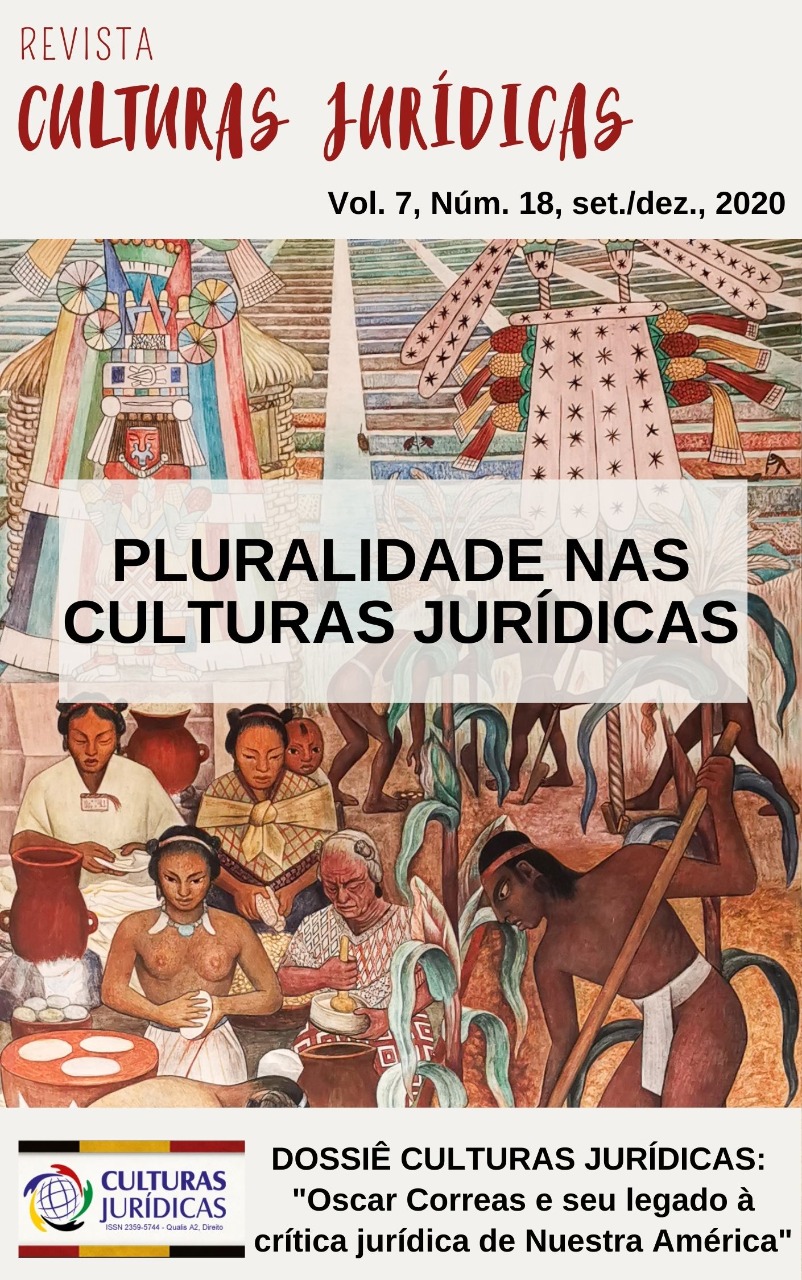JUDICIALIZAÇÃO DA PANDEMIA DE COVID-19 NO BRASIL.../THE JUDICIALIZATION OF THE COVID-19 PANDEMIC IN BRAZIL.../LA JUDICIALIZACIÓN DE LA PANDEMIA DE COVID-19 EN EL BRASIL...
Palabras clave:
Judicialização, Covid-19, Processamento de Linguagem Natural, Linguística de Corpus, Modelagem de TópicosResumen
A JUDICIALIZAÇÃO DA PANDEMIA DE COVID-19 NO BRASIL: ESTUDO DE CASO SOBRE A APLICAÇÃO DO MÉTODO DE MODELAGEM DE TÓPICOS PARA AGRUPAMENTO DE DOCUMENTOS JURÍDICOSResumo: O presente artigo pretende realizar uma investigação exploratória e empírica a respeito da judicialização da epidemia de Covid-19 no Brasil. Para realizar este objetivo foi criado um corpus de documentos jurídicos sobre o tema, que posteriormente passou pelo escrutínio de ferramentas de processamento de linguagem natural e linguística computacional. Ao fim da análise, encontrou-se grande predominância das discussões relativas à gestão da população dos sistemas prisionais e socioeducativos, sobretudo em função da grande repercussão alcançada pela Recomendação nº 62/2020 do CNJ. O estudo aponta para futuras linhas de investigação sobre o tema dos impactos da Covid-19 no sistema judiciário brasileiro e sinaliza o potencial existente na utilização da abordagem computacional para análise de grandes quantidades de dados jurídicos.
THE JUDICIALIZATION OF THE COVID-19 PANDEMIC IN BRAZIL: A CASE STUDY ON THE APPLICATION OF TOPIC MODELING FOR GROUPING LEGAL DOCUMENTS
Abstract: This article intends to carry out an exploratory and empirical investigation regarding the judicialization of the Covid-19 epidemic in Brazil. To achieve this objective, a corpus of legal documents on the subject was created, which subsequently went through the scrutiny of natural language processing and computational linguistic tools. At the end of the analysis, there was a great predominance of discussions regarding the management of the population of the prison and socio-educational systems, mainly due to the great repercussion achieved by Recommendation No. 62/2020 of the CNJ. The study points to future lines of investigation on the subject of the impacts of Covid-19 on the Brazilian judicial system and signals the potential that exists in using the computational approach to analyze large amounts of legal data.
LA JUDICIALIZACIÓN DE LA PANDEMIA DE COVID-19 EN EL BRASIL: UN ESTUDIO DE CASO SOBRE LA APLICACIÓN DEL MÉTODO DE MODELIZACIÓN TEMÁTICA PARA LA AGRUPACIÓN DE DOCUMENTOS JURÍDICOS
Resumen: Este artículo pretende llevar a cabo una investigación exploratoria y empírica sobre la judicialización de la epidemia de Covid-19 en Brasil. Para lograr este objetivo, se creó un corpus de documentos jurídicos sobre el tema, que más tarde se sometió al escrutinio de las herramientas de procesamiento del lenguaje natural y la lingüística computacional. Al final del análisis, hubo un gran predominio de los debates sobre la gestión de la población en los sistemas penitenciarios y socioeducativos, debido principalmente a la gran repercusión lograda por la Recomendación 62/2020 del CNJ. El estudio apunta a futuras líneas de investigación sobre el tema de las repercusiones del Covid-19 en el sistema judicial brasileño y señala el potencial existente en el uso del enfoque computacional para el análisis de grandes cantidades de datos jurídicos.
Descargas
Citas
BARROSO, Luís Roberto. A Judicialização da Vida e o Papel do Supremo Tribunal Federal. Belo Horizonte: Forum, 2018.
BLEI, David M. Probabilistic topic models. Communications of the ACM, v. 55, n. 4, p. 77-84, 2012.44.
BOEING, Daniel H. Arruda; ROSA, Alexandre Morais da. Ensinando um robô a julgar: pragmática, discricionariedade e vieses no uso de aprendizado de máquina no judiciário. Florianópolis: EMais, 2020.
BOYD-GRABER, Jordan; MIMNO, David; NEWMAN, David. Care and feeding of topic models: Problems, diagnostics, and improvements. Handbook of mixed membership models and their applications, v. 225-255, 2014.
FILHO, Marçal Justen et al. COVID-19 e o Direito brasileiro. Curitiba: Justen, Pereira, Oliveira & Talamini, 2020.
JELODAR, Hamed et al. Latent Dirichlet Allocation (LDA) and Topic modeling: models, applications, a survey. Multimedia Tools and Applications, v. 78, n. 11, p. 15169-15211, 2019.
LIVERMORE, Michael A.; ROCKMORE, Daniel Nahum (Ed.). Law as Data: Computation, Text, & the Future of Legal Analysis. Santa Fé Institute Press, 2019.
MATIDA, Janaina. É preciso se dar fim à seletividade probatória. Consultor Jurídico, 2020. Disponível em: https://www.conjur.com.br/2020-jul-17/limite-penal-preciso-dar-fim-seletividade-probatoria. Acesso em: 17 jul. 2020.
MINAYO, Maria Cecília de Souza; RIBEIRO, Adalgisa Peixoto. Condições de saúde dos presos do estado do Rio de Janeiro, Brasil. Ciênc. saúde coletiva, Rio de Janeiro, v. 21, n. 7, p. 2031-2040, July 2016. Disponível em: <http://www.scielo.br/scielo.php?script=sci_arttext&pid=S1413-81232016000702031&lng=en&nrm=iso>. Acesso em 30 Jun. 2020. http://dx.doi.org/10.1590/1413-81232015217.08552016.
PISTOR, Katharina. Law in the Time of COVID-19. Columbia Law School, 2020.
POSSÍDIO, Cyntia; MARTINEZ, Luciano. O trabalho nos tempos do Coronavírus. São Paulo: Saraiva Educação SA, 2020.
ROSENVALD, Nelson et al. Coronavirus e responsabilidade civil: impactos contratuais e extracontratuais. Editora Foco, 2020.
SARDINHA, Tony Berber. Lingüística de corpus: histórico e problemática. Delta: documentação de estudos em lingüística teórica e aplicada, v. 16, n. 2, p. 323-367, 2000.
VALLINDER, Torbjörn. The Judicialization of Politics. A World-Wide Phenomenon: Introduction. International Political Science Review/Revue internationale de science politique, p. 91-99, 1994.
VIANNA, Luiz Werneck. A judicialização da política e das relações sociais no Brasil. Rio de Janeiro: Editora Revan, 1999.
##submission.downloads##
Publicado
Versiones
- 2021-04-01 (3)
- 2021-04-01 (2)
- 2020-11-12 (1)





